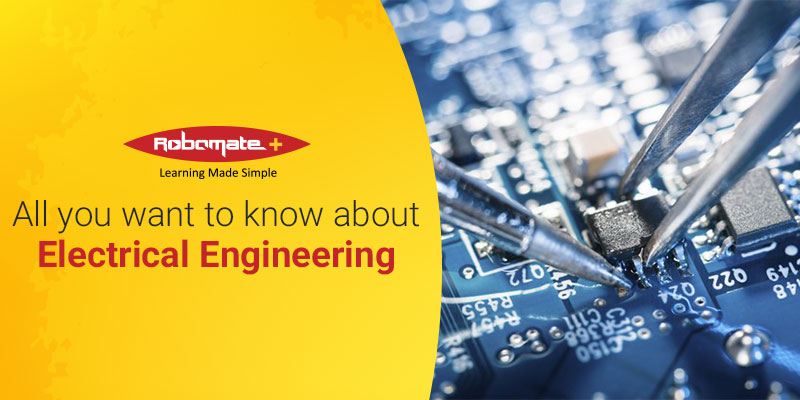Electrical engineering is all about electricity, electronics, and electromagnetism. It is a vast field which is sub-divided into different fields such as electronics, microelectronics, digital computers, computer engineering, power engineering, telecommunications, etc. They utilize the equipment ranging from voltmeter to a high-end analyzer. Being an electrical engineer is a challenging job and the candidates are required to master their theoretical and practical skills and knowledge to be successful in the field.
Job Profile of Electrical Engineer:
Before taking any field, students will be eager to know the job profile and the scope. Here we give you the job profile
- Designing of electrical systems
- Development and testing of electrical components
- Evaluation of electrical systems with the knowledge of electricity and materials, an electrical engineer should be able to design and conduct research based on the existing systems.
- Evaluate the electrical systems and its components for capabilities and defining the testing methods and testing properties.
- An electrical engineer is responsible for developing and designing the system and its components for its capabilities as per the requirements of the organization. They will be responsible for designing and modifying the stand electrical systems for building and assembling of electrical components and ease operators functioning
- Manufacture and assembly of the materials and development of procedures for research and testing
- Development of methods and procedures for assessing the product quality of the finished products and the system qualities
- It is not just developing and designing methods but also making periodic product reports by collecting and summarizing the information of the finished product system and the system capabilities.
- Answering customer questions and queries and develops procedures for taking feedback from the customer of its electrical components. Develop procedures for the operation of equipment for the manufacturer’s instructions and the procedures to overcome troubleshooting. The customer can request repair service.
- Maintenance of product quality and comply with the local federal and state regulations
- Training and guidance of the newly hired technicians
- Maintenance of data about the product
An electrical engineer should keep the knowledge up to date by attending educational workshops, professional societies, publications, and personal networks.
Top Electrical Engineering Colleges in India
- IIT Bombay – Indian Institute Of Technology
- IIT Delhi – Indian Institute Of Technology
- Indian Institute of Technology, Kharagpur
- Birla Institute of Technology and Science
- IIT Madras – Indian Institute of Technology Chennai
- DTU – Delhi Technological University
- Anna University
- National Institute of Technology, Surathkal
Subjects in Electrical Engineering
Electrical engineering is a vast subject which covers various topics involved in the field of electric instruments including daily use of electrical items. The major subjects in Electrical Engineering are
- Basics of Electronics Engineering
- Electrical machines
- Fiber-optics
- Introduction to manufacturing processes
- Opto-Electronics
- Power generation
- Power Systems
- Semiconductor Devices Technology
- Signals systems and networks
Top Companies Hiring Electrical Engineers
Well established and reputed colleges are often a place for branded companies to absorb the young budding talent of the country. The companies visit the campus and interview the candidate for their knowledge and skill and select them for a good package. Most companies also offer a stipend to candidates during their training period. Here we list you the top companies which offer campus placements
- Bajaj International Private Ltd
- Bharat Heavy Electricals Limited (BHEL)
- Crompton Greaves Limited (CGL)
- Dev Denso Power Ltd
- Info Edge (India) Ltd
- Penguin Engineering Ltd
- Bristol Fire Engineering
- Kelvin Electrical
- Siemens Ltd
- Wipro Lighting.
Skills Required for an Electrical Engineer:
Here we list the skills required for an electrical engineer
Critical thinking: Electrical engineers should analyze their strengths and weaknesses and device procedures to solve problems. Critical thinking helps you in assessing the situation and get the best result out of it.
Functioning of circuits: The entire concept of electrical engineering is based on the circuits, as a student of electrical engineering, the staff makes sure that the student is well-trained about the functioning of are clear about the design and fixing of circuits.
Electrical Measurements: the flow of electrical current in the circuits and how the components of the circuit react to one another defines the functioning. Electrical measurements help in devising new electronic devices and also repair of the old electronic devices. The Candidates should be well-versed with the knowledge to read and manipulate the electrical instruments. The right quantity of electricity in the electronic device is required. Less electricity may not produce the desired effect and high may explode the device, an electrical engineer should be in a position to define the amount of electricity which can be flown in the circuit to allow easy and smooth functioning of the device.
Apart from the technical skills, the candidate should be a quick learner, have good interpersonal communication skills, Organizational Skills, and innovative thinking
Programming Languages: The programming languages C/C++ and MATLAB are important to understand the embedded system, analyzing data and designing circuits. To work and design various electronic devices programming languages are very important for designing circuits and solving equations.
Entrance Exams and Admission:
Candidates who intend to take admission in electrical engineering can write state level or national level entrance exams such as JEE Main, JEE Advanced and BITSAT. In addition, the candidates can get direct admission into the colleges and in the management quota, NRI candidates are also eligible for admission. It is mandatory for the candidates to pass 10+2 to get admission into the 4-year engineering program. Diploma holders can also seek admission into 4 years course.
Courses:
The candidates have the option f doing diploma in electrical engineering or 4 years degree course depending upon the students’ choice. Diploma holders can change join the bachelor’s degree program after completion by writing the lateral entrance exam. A number of institutes are available which offer different courses (Diploma, Bachelor Degree or Master Degree or Advanced Diploma) in electrical engineering. Before selecting the course make a note that your profile and package will depend upon your qualification. Here we list the programs for electrical engineering
Diploma Course:
Candidates who have passed the board exam are eligible for doing diploma course. Diploma holders can change join the bachelor’s degree program after completion by writing the lateral entrance exam.
Duration – 2 to 3 years
Eligibility: should pass 10th class
Entrance: state polytechnic entrance exams.
Undergraduate Courses:
In order to be eligible for the bachelor’s program the candidate should have Physics, Chemistry, and Mathematics as their main subjects
Duration: 4 years
Eligibility: should pass 10 + 2 class
Entrance: state level entrance exams or JEE Advance or Mains
Master Courses:
Duration: Two-Year Master Degree program
Eligibility: The candidate should hold a bachelor’s degree in electrical engineering. Each college or institute has its predefined minimum aggregate in the subjects to get admission and the rank in the entrance exam. The candidates have to write GATE entrance test or by direct admission into the management, quota to apply for M. Tech courses.
Ph.D.:
Duration: Three to Five Year Degrees
Eligibility: The candidate should have a master degree in the relevant field in order to be eligible for course in the doctorate program.
Download Important Facts & Formulae for JEE












